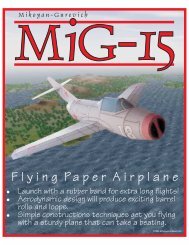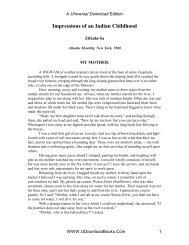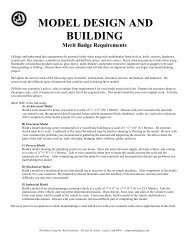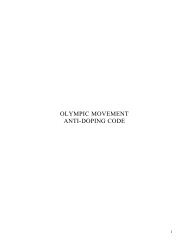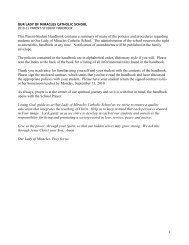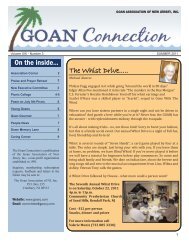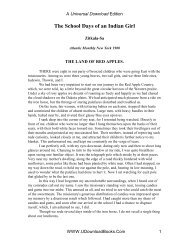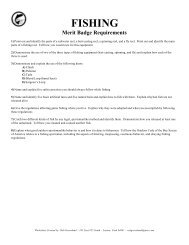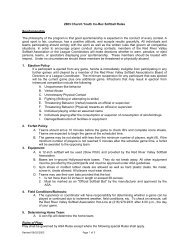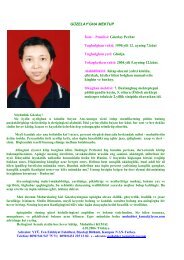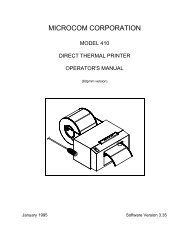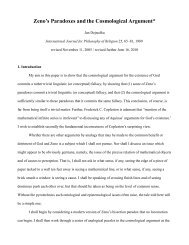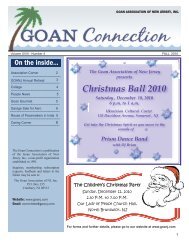Dummett's Backward Road to Frege and to Intuitionism - Tripod
Dummett's Backward Road to Frege and to Intuitionism - Tripod
Dummett's Backward Road to Frege and to Intuitionism - Tripod
Create successful ePaper yourself
Turn your PDF publications into a flip-book with our unique Google optimized e-Paper software.
e parts of thoughts, due <strong>to</strong> the context principle in its application <strong>to</strong> senses; even thoughts are parts of<br />
compound thoughts. Indeed, that is a second way the text says or very plainly implies that no senses are<br />
objects. Namely, it says a truth-value cannot be a part of a thought because it is an object. And what is<br />
a sense but a part of a thought? The context principle dem<strong>and</strong>s this. Even a thought must be a part of<br />
indefinitely many compound thoughts. <strong>Frege</strong> is saying here that an object cannot be a part of a thought,<br />
<strong>and</strong> is thus saying or very plainly implying that an object cannot be a sense. For only a sense can be a<br />
part of a thought. (Since thoughts <strong>and</strong> other senses are timeless <strong>and</strong> unchanging, a sense can be a part<br />
of a thought if <strong>and</strong> only if it must be a part of a thought.) I think the text so plainly implies that an<br />
object cannot be a sense, that it takes only the slightest charity (if it takes any charity at all) <strong>to</strong> say that<br />
<strong>Frege</strong> is expressly asserting this. For the only thing the implication assumes is that only a sense can be<br />
a part of a thought; <strong>and</strong> the whole of “On Sense <strong>and</strong> Reference” up <strong>to</strong> this point makes that clear.<br />
<strong>Frege</strong> wrote “On Sense <strong>and</strong> Reference,” in which he says that a truth-value is not a sense<br />
because it is an object, <strong>and</strong> therefore that in general an object is not a sense because it is an object,<br />
almost at the same time as “Function <strong>and</strong> Concept” <strong>and</strong> Grundgesetze vol. 1, in which Dummett<br />
believes <strong>Frege</strong> says that every entity is either an object or a function, <strong>and</strong> “On Concept <strong>and</strong> Object,” in<br />
which Dummett believes <strong>Frege</strong> says that the singular definite article always indicates an object in every<br />
possible context, including even contexts which shift reference <strong>to</strong> indirect reference. <strong>Frege</strong> never<br />
suggests that these four works contradict each other in the least on whether senses are objects or<br />
functions. To the contrary, <strong>Frege</strong> presents the works as being all of one piece. This is easily explained<br />
on my interpretation. Looking <strong>to</strong> the context of each text Dummett cites, <strong>Frege</strong> is saying only that all<br />
cus<strong>to</strong>mary references are either objects or functions, <strong>and</strong> only that in contexts of cus<strong>to</strong>mary reference,<br />
the singular definite article always indicates an object. But how can Dummett reconcile the texts?<br />
The problem of the sense of expression “A,” which <strong>Frege</strong> never mentions, is subtler than the<br />
problem of the concept horse. For there is a tension here between the fact that the singular definite<br />
48



